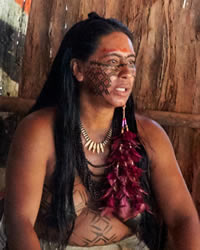Desana in Brazil

Photo Source:
Tim Ellis - Flickr
Creative Commons
|
Send Joshua Project a map of this people group.
|
| People Name: | Desana |
| Country: | Brazil |
| 10/40 Window: | No |
| Population: | 2,300 |
| World Population: | 6,100 |
| Primary Language: | Desano |
| Primary Religion: | Ethnic Religions |
| Christian Adherents: | 20.00 % |
| Evangelicals: | 3.00 % |
| Scripture: | New Testament |
| Ministry Resources: | Yes |
| Jesus Film: | No |
| Audio Recordings: | No |
| People Cluster: | South American Indigenous |
| Affinity Bloc: | Latin-Caribbean Americans |
| Progress Level: |
|
Introduction / History
The Indigenous people who live along the Uaupés River and its tributaries belong to 17 different ethnic groups, many of which also live in Colombia. These groups speak languages from the Eastern Tukano family and are part of a wide network of exchange. They share marriages, rituals, and trade, forming a well-connected culture often called the "Uaupés/Pira-Paraná social system."
One of these groups is called the Desana. They also refer to themselves as Umukomasã, which translates to “people of the universe.”
What Are Their Lives Like?
The Desana are known for their skill in basket weaving and their shamanic traditions. They produce special types of woven baskets, such as large apás (baskets with vine frames) and cumatás.
In the past, the Desana lived in large, shared houses spread out along the river. Today, they live in individual family homes.
Men hunt animals like tapirs, deer, monkeys, different types of birds, and wild pigs. Fishing is also very important. Women gather fruit and take care of the gardens, where they grow bananas, peppers, sugarcane, tobacco, coca, and a few fruit trees. Each family usually has 4 or 5 garden areas. Women do most of the planting and grow many types of cassava, plantains, pineapple, peppers, corn, and sugarcane.
The ashes from burned trees are used as good planting soil. Hunting is seen as a less reliable food source and requires more rituals. Farming is more dependable and it needs fewer rituals.
What Are Their Beliefs?
The Desana religion, like that of many Indigenous groups, mixes creation stories, shamanism, and rituals. But due to the influence of the Catholic Church, much of their original shamanism has been lost or blended with Catholic beliefs.
They connect with the spiritual world by drinking a hallucinogenic drink called caapi. The whole community takes part in the rituals, but only men drink the caapi and go into a trance. Women support them and join in the dances.
They believe these trances allow them to meet mythological creators or ancestors. Animals and plants also “speak” during these times, sharing how they want to be treated and protected.
What Are Their Needs?
They need true spiritual direction. They need to know who Jesus is, who God is, and who the Holy Spirit is.
Prayer Points
Pray that the Lord reveals Himself to them in the middle of nature.
Ask God to give missionaries and Christians around them the wisdom to approach them in a smart and caring way—to build trust and show Jesus through their actions.
Pray that their experiences with the Holy Spirit help them understand the truth about the spiritual world and free them from any lies or deception.